Juan Rodriguez
StarFlow: Generating Structured Workflow Outputs From Sketch Images
Mar 27, 2025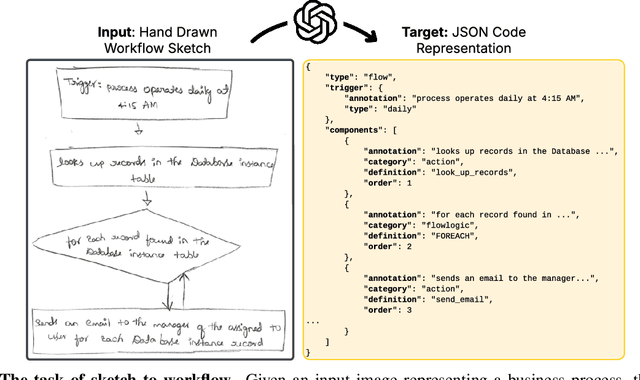


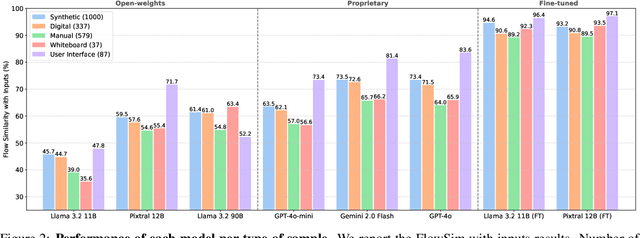
Abstract:Workflows are a fundamental component of automation in enterprise platforms, enabling the orchestration of tasks, data processing, and system integrations. Despite being widely used, building workflows can be complex, often requiring manual configuration through low-code platforms or visual programming tools. To simplify this process, we explore the use of generative foundation models, particularly vision-language models (VLMs), to automatically generate structured workflows from visual inputs. Translating hand-drawn sketches or computer-generated diagrams into executable workflows is challenging due to the ambiguity of free-form drawings, variations in diagram styles, and the difficulty of inferring execution logic from visual elements. To address this, we introduce StarFlow, a framework for generating structured workflow outputs from sketches using vision-language models. We curate a diverse dataset of workflow diagrams -- including synthetic, manually annotated, and real-world samples -- to enable robust training and evaluation. We finetune and benchmark multiple vision-language models, conducting a series of ablation studies to analyze the strengths and limitations of our approach. Our results show that finetuning significantly enhances structured workflow generation, outperforming large vision-language models on this task.
Too Big to Fool: Resisting Deception in Language Models
Dec 13, 2024Abstract:Large language models must balance their weight-encoded knowledge with in-context information from prompts to generate accurate responses. This paper investigates this interplay by analyzing how models of varying capacities within the same family handle intentionally misleading in-context information. Our experiments demonstrate that larger models exhibit higher resilience to deceptive prompts, showcasing an advanced ability to interpret and integrate prompt information with their internal knowledge. Furthermore, we find that larger models outperform smaller ones in following legitimate instructions, indicating that their resilience is not due to disregarding in-context information. We also show that this phenomenon is likely not a result of memorization but stems from the models' ability to better leverage implicit task-relevant information from the prompt alongside their internally stored knowledge.
BigDocs: An Open and Permissively-Licensed Dataset for Training Multimodal Models on Document and Code Tasks
Dec 05, 2024



Abstract:Multimodal AI has the potential to significantly enhance document-understanding tasks, such as processing receipts, understanding workflows, extracting data from documents, and summarizing reports. Code generation tasks that require long-structured outputs can also be enhanced by multimodality. Despite this, their use in commercial applications is often limited due to limited access to training data and restrictive licensing, which hinders open access. To address these limitations, we introduce BigDocs-7.5M, a high-quality, open-access dataset comprising 7.5 million multimodal documents across 30 tasks. We use an efficient data curation process to ensure our data is high-quality and license-permissive. Our process emphasizes accountability, responsibility, and transparency through filtering rules, traceable metadata, and careful content analysis. Additionally, we introduce BigDocs-Bench, a benchmark suite with 10 novel tasks where we create datasets that reflect real-world use cases involving reasoning over Graphical User Interfaces (GUI) and code generation from images. Our experiments show that training with BigDocs-Bench improves average performance up to 25.8% over closed-source GPT-4o in document reasoning and structured output tasks such as Screenshot2HTML or Image2Latex generation. Finally, human evaluations showed a preference for outputs from models trained on BigDocs over GPT-4o. This suggests that BigDocs can help both academics and the open-source community utilize and improve AI tools to enhance multimodal capabilities and document reasoning. The project is hosted at https://bigdocs.github.io .
InsightBench: Evaluating Business Analytics Agents Through Multi-Step Insight Generation
Jul 08, 2024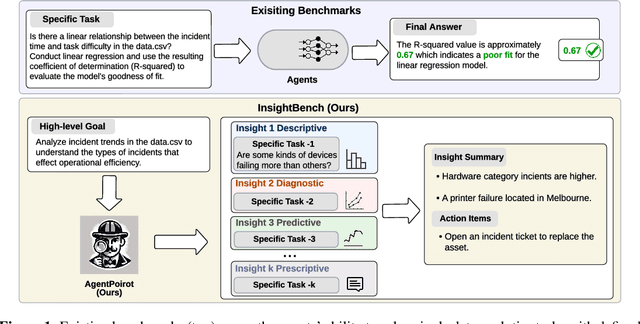
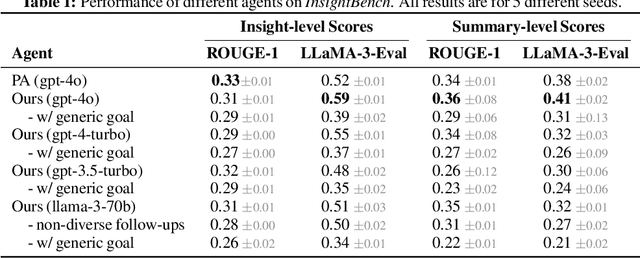

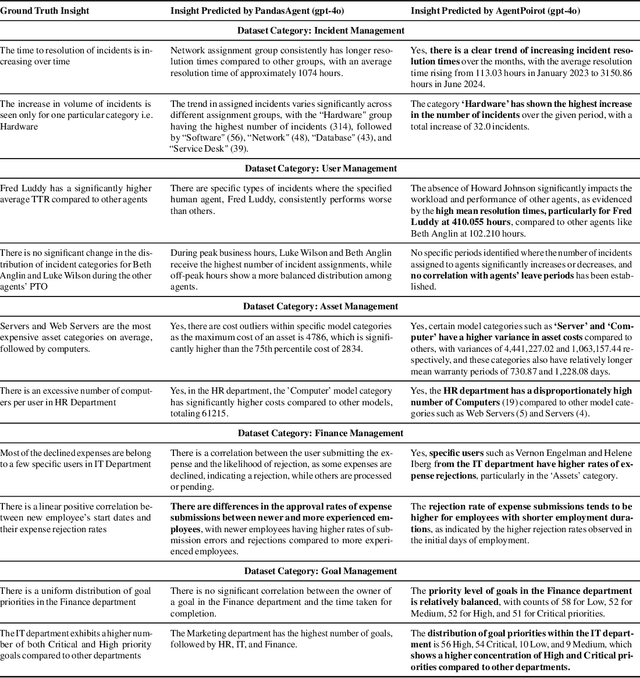
Abstract:Data analytics is essential for extracting valuable insights from data that can assist organizations in making effective decisions. We introduce InsightBench, a benchmark dataset with three key features. First, it consists of 31 datasets representing diverse business use cases such as finance and incident management, each accompanied by a carefully curated set of insights planted in the datasets. Second, unlike existing benchmarks focusing on answering single queries, InsightBench evaluates agents based on their ability to perform end-to-end data analytics, including formulating questions, interpreting answers, and generating a summary of insights and actionable steps. Third, we conducted comprehensive quality assurance to ensure that each dataset in the benchmark had clear goals and included relevant and meaningful questions and analysis. Furthermore, we implement a two-way evaluation mechanism using LLaMA-3-Eval as an effective, open-source evaluator method to assess agents' ability to extract insights. We also propose AgentPoirot, our baseline data analysis agent capable of performing end-to-end data analytics. Our evaluation on InsightBench shows that AgentPoirot outperforms existing approaches (such as Pandas Agent) that focus on resolving single queries. We also compare the performance of open- and closed-source LLMs and various evaluation strategies. Overall, this benchmark serves as a testbed to motivate further development in comprehensive data analytics and can be accessed here: https://github.com/ServiceNow/insight-bench.
 Add to Chrome
Add to Chrome Add to Firefox
Add to Firefox Add to Edge
Add to Edge